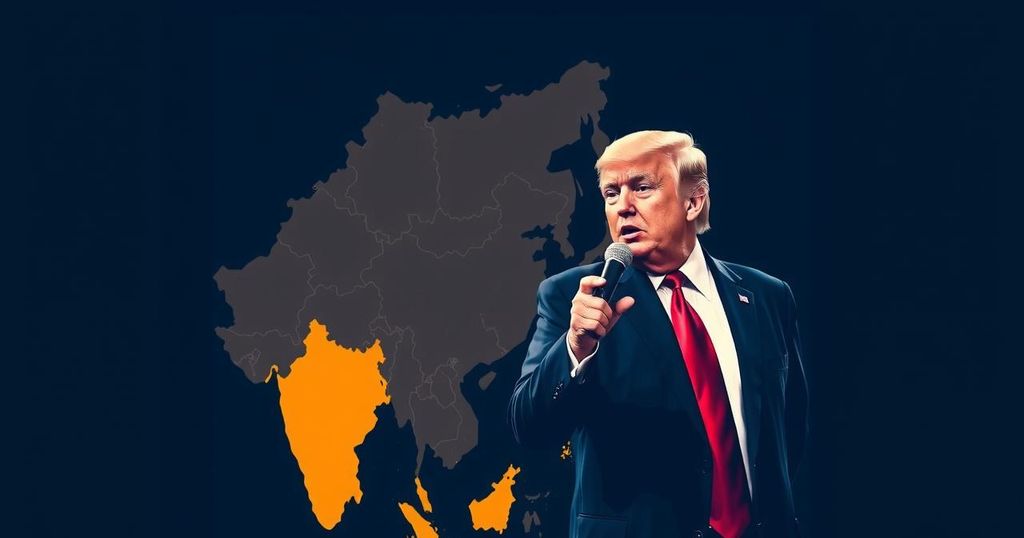Global news
AMERICA, ASIA, BANGLADESH, BIDEN, DAILY STAR, DEMOCRAT, DONALD J TRUMP, EUROPE, FOREIGN POLICY, HARRIS, HOUSE OF REPRESENTATIVES, INDIA, INTERNATIONAL RELATIONS, ISRAEL, JOE BIDEN, KAMAL, MIDDLE EAST, NATIONAL SECURITY, NEPAL, NORTH AMERICA, PAKISTAN, SENATE, SRI LANKA, SUBCONTINENT, UKRAINE, UNITED STATES, UNITED STATES OF AMERICA, US, WHITE HOUSE
Leila Ramsay
0 Comments
Reflections on Trump’s Second Presidency: Insights from South Asian Press
Donald J. Trump has returned as the President of the United States, with implications for South Asia being largely overlooked. The press in Pakistan, Bangladesh, Nepal, and Sri Lanka expresses concerns over potential diplomatic strains, trade implications, and political dynamics under his leadership, along with cautious optimism for future relations.
Following the recent presidential elections on November 5, 2024, former President Donald J. Trump has made a historic return to the White House, becoming the 47th President of the United States. While the ramifications of his return are widely debated in the United States, particularly concerning issues related to the Middle East and the ongoing war in Ukraine, less attention has been focused on the implications for South Asia. This article summarizes perspectives from the media in Pakistan, Bangladesh, Nepal, and Sri Lanka regarding a second Trump presidency. In Pakistan, the editorial team at Dawn attributes Trump’s electoral success to domestic discontent, notably high inflation and perceived arrogance among Democrats, particularly Joe Biden’s derogatory remarks about Trump supporters. They emphasize the likelihood of continued strained relations under Trump, stating, “As for Pakistan, the last few American administrations have maintained lukewarm ties with this country, and there is little to suggest an improvement in relations under the new Trump set-up.” Bangladesh’s The Daily Star acknowledges the significant electoral vote margin between Trump and Biden, estimating that these results could lead to notable shifts in trade dynamics, climate change policy, and foreign relations, particularly concerning regional powers. There is apprehension regarding Trump’s remarks on violence against minorities in Bangladesh, raising concerns about the U.S. perspective on the country: “…the US ‘view[ing] Bangladesh through India’s lens.’” Nevertheless, there is cautious optimism as Chief Adviser Prof Muhammad Yunus has expressed hope for enhanced bilateral relations. In Nepal, The Kathmandu Post comments on American voters’ rejection of criticisms pertaining to Trump’s leadership style, suggesting that emotional appeals were more persuasive than rational arguments. They caution against the rise of a “strongman” leader in their own political landscape, asserting that “If the US, with its strong history of check and balance, is struggling to manage a single man’s challenge to democracy, a country like Nepal with its weak institutions will be a lot more vulnerable to despotism.” Sri Lanka’s The Island draws parallels between the political situations in both countries, critiquing Trump’s potential revival while noting that his second term may not necessarily be worse than Biden’s administration. The editorial highlights pressing global issues likely to feature in Trump’s agenda, such as the Gaza conflict and relations with NATO, without clearly stating outcomes during his term: “…one may not know, but his presidency surely won’t be worse than Biden’s. One can only keep one’s fingers crossed.”
The recent re-election of Donald Trump as President of the United States brings forth discussions not only within American political circles but also regarding the ramifications of his leadership on South Asian countries. The media across Pakistan, Bangladesh, Nepal, and Sri Lanka reflect a variety of perspectives that highlight local concerns about trade, political relations, and international support as they brace for the implications of a Trump presidency.
The reactions from the press in South Asian countries to Donald Trump’s return to the presidency reveal a complex landscape of apprehensions and cautious optimism. While there is recognition of the potential challenges to diplomatic relations and trade, there is also an undercurrent of hope for strengthening ties amidst evolving political dynamics. As these nations navigate their futures in the shadow of U.S. policy, the overall tone suggests vigilance and determination to advocate for their interests.
Original Source: indianexpress.com




Post Comment